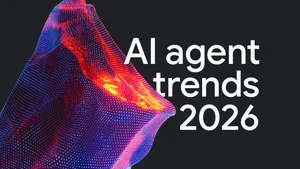A new report explores the economic impact of generative AI

Editor’s note: Today, we released a report from inaugural Technology & Society Visiting Fellow 1 Andrew McAfee on the potential economic impacts of generative AI. This report is the product of McAfee’s original research on AI and the economy, working closely with experts across Google to focus on how the recent surge in generative AI may impact productivity, labor markets, and the skills workers need to succeed in an AI-powered economy.
Read on for Andrew McAfee’s overview or download the full report.
Generative AI is one of the rare technologies powerful enough to accelerate overall economic growth — what economists call a “general-purpose technology.” These innovations have the potential to positively transform economies and societies.
By one estimate, close to 80% of the jobs in the U.S. economy could see at least 10% of their tasks done twice as quickly (with no loss in quality) via the use of generative AI.
Previous general-purpose technologies like the steam engine and electrification have brought their changes over decades. However, we anticipate that generative AI’s effects will be felt more quickly due to its ability to diffuse quickly via the internet and its ease of use owing to its natural language interface.
This technology is already delivering large productivity gains, which will increase and spread as people and organizations come up with complementary innovations that leverage generative AI’s capabilities. As a result, overall productivity will improve, resulting in an acceleration of economic growth.
In addition to faster growth, generative AI will bring other changes. It will reduce demand for some skills, increase demand for others, and create demand for entirely new ones.
Fears of large-scale technological unemployment are probably overblown. The history of general-purpose technologies shows that the growth they bring is accompanied by strong demand for labor.
However, this increased demand is often in new occupations. For example, more than 85% of total U.S. employment growth since 1940 has come in entirely new occupations.
The rapid changes brought by the spread of generative AI will require prompt and effective reskilling efforts. These efforts will be able to draw on generative AI itself, a tool with the unique ability to help people learn how to use it better. And because generative AI accumulates knowledge and makes it available on demand, it’s particularly effective at improving the performance of entry-level employees, helping with wage inequality.
Previous general-purpose technologies have resulted in changes to the companies and countries leading the way in different industries. We believe that generative AI will be similarly powerful.






